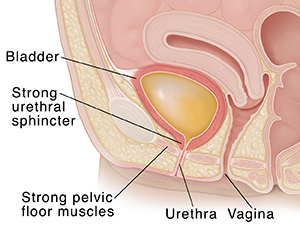Treating Incontinence in Women: Nonsurgical Methods
The best treatment for you will depend on the type of incontinence you have. Your symptoms, age, and any underlying problems that are found also affect your treatment. Some types of incontinence may over time require surgery. But nonsurgical treatments may be effective in many cases. Nonsurgical treatments include lifestyle changes, muscle-strengthening exercises, and medicines.
Nonsurgical treatments
Treatment for stress urinary incontinence includes:
-
Bladder training
-
Lifestyle changes, such as weight loss and increased activity if incontinence is due to being overweight
-
Medicines, if bladder training has not helped
-
Pelvic floor muscle exercises
Lifestyle changes
-
Losing weight. Excess weight puts extra pressure on the pelvic floor muscles. Exercising and eating right can help you lose weight. This helps other treatments work better.
-
Making certain changes in your diet. Some foods may make you need to urinate more, so it may be good not to have them. These include caffeinated drinks and alcohol. Ask your healthcare provider if these or other changes in your diet might be helpful.
-
Quitting smoking. Smoking can lead to a long-term (chronic) cough that strains pelvic floor muscles. Smoking may also damage the bladder and urethra.
Pelvic floor muscle exercises
There are exercises you can do to help strengthen your pelvic floor muscles. The pelvic floor muscles act as a sling to help hold the bladder and urethra in place. These muscles also help keep the urethra closed. Weak pelvic floor muscles may allow urine to leak. To strengthen the pelvic floor muscles, do the exercises daily. In a few months, the muscles will be stronger and tighter. This can help prevent urine leakage.

© 2000-2024 The StayWell Company, LLC. All rights reserved. This information is not intended as a substitute for professional medical care. Always follow your healthcare professional's instructions.